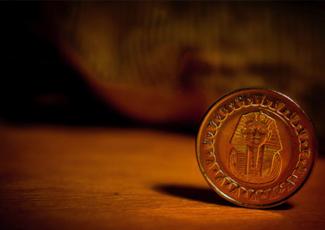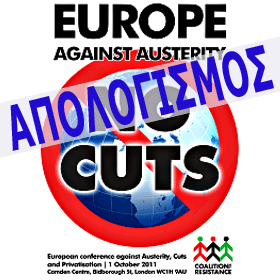 D’où vient la dette ? A-t-elle été contractée dans l’intérêt général, ou bien au bénéfice de minorités déjà privilégiées ? Qui détient ses titres ? Peut-on alléger son fardeau autrement qu’en appauvrissant les populations ?
D’où vient la dette ? A-t-elle été contractée dans l’intérêt général, ou bien au bénéfice de minorités déjà privilégiées ? Qui détient ses titres ? Peut-on alléger son fardeau autrement qu’en appauvrissant les populations ?
Oct 27 2011 - Jadaliyya Reports
The Popular Campaign to Drop Egypt’s Debts
“You Pay, You Monitor”
Founding Statement
 The Popular Campaign to Drop Egypt’s Debts was conceived as part of the January 25th Revolution, and affirms the right of the Egyptian people to assert collective control over all matters related to their life and the future of coming generations.
The Popular Campaign to Drop Egypt’s Debts was conceived as part of the January 25th Revolution, and affirms the right of the Egyptian people to assert collective control over all matters related to their life and the future of coming generations.
23 de octubre de 2011
15O: indignación global
Por Josep Maria Antentas, Esther Vivas
 La jornada del 15 de octubre (15O) ha sido la primera respuesta global coordinada a la crisis y señala la emergencia de un nuevo movimiento internacional. Con las revoluciones del norte de África como aguijón inicial, mediante un efecto de emulación e imitación, la protesta llegó a la periferia de Europa.
La jornada del 15 de octubre (15O) ha sido la primera respuesta global coordinada a la crisis y señala la emergencia de un nuevo movimiento internacional. Con las revoluciones del norte de África como aguijón inicial, mediante un efecto de emulación e imitación, la protesta llegó a la periferia de Europa.
[Europe Solidaire Sans Frontières]
Modernité de l’ancien et ancienneté du moderne en Grèce
par FASFALIS Dimitris
La Grèce et son peuple sont devenus, sous les projecteurs des médias de masse depuis janvier 2010, l’archétype de l’archaïsme en Europe. Le cliché colporté défie toute discussion de fond : voici un peuple fraudeur et vivant au-dessus de ses moyens, responsable du manque de compétitivité de son économie, plus enclin à la grève qu’au travail créatif, dirigé par une classe politique clientéliste et corrompue, elle-même incapable de faire respecter la loi et de recueillir les recettes fiscales nécessaires pour les dépenses de la collectivité.
Discurso de Sonia Mitralia na Conferência de Londres contra a Austeridade
organizada pela Coalition of Resistence em 01-10-2011
Venho da Grécia – um país que está a ser sangrado e destruído por aqueles que pretensamente querem salvá-lo: o Fundo Monetário Internacional, o Banco Central Europeu e a Comissão Europeia. Após a adopção, a aplicação e sobretudo... o falhanço dos quatro tratamentos de choque denominados Memoranda, e a aplicação actualmente do quinto, que é o mais duro e desumano, a Grécia já não é o país que conhecíamos. Agora as ruas ficam vazias depois do pôr-do-sol; os restaurantes esperam desesperadamente por clientes; e as lojas das ruas de comércio, desertas, caem na ruína. O porquê desta metamorfose é-nos revelado pelos números: os assalariados e os reformados já perderam 30-50%, ou mesmo mais, do seu poder de compra. Em consequência, cerca de 30% das lojas ou 35% das bombas de gasolina encerraram definitivamente. O desemprego atingirá provavelmente 30% no próximo ano. Teremos menos 40% de hospitais e de camas de hospital; o Estado grego encontra-se, desde há dias, incapacitado de fornecer os livros escolares aos alunos e por isso convida-os a fazerem fotocópias (!); etc. Em suma, já se vê a fome, sim, a fome, a entrar pelas grandes cidades, enquanto os suicídios se multiplicam, num país mergulhado no stress e no desespero...
Grèce : « un pays en train d’être saigné à blanc et détruit par ceux qui prétendent le sauver »
1er octobre 2011 MITRALIAS Sonia
Intervention à la Conférence de Londres contre l’austérité organisée par la Coalition of Resistance (1er octobre 2011).
Je viens de Grèce, un pays en train d’être saigné à blanc et détruit par ceux qui prétendent le sauver, le Fonds Monétaire International, la Banque Centrale Européenne et la Commission Européenne. Après l’adoption, l’application et surtout…l’échec des quatre traitements de choc appelés Memoranda, et l’application actuellement du cinquième, qui est le plus dur et inhumain, la Grèce n’est plus le pays qu’on connaissait : Maintenant, les rues se vident après le coucher du soleil, les restaurants cherchent désespérément des clients et les magasins des rues commerçantes désertées tombent en ruine. Le pourquoi de cette métamorphose est donné par ces quelques chiffres : Les salariées et les retraites ont déjà perdu 30%-50% et parfois même plus de leur pouvoir d’achat. Ce qui a comme conséquence qu’environ 30% des magasins ou 35% des pompes a essence sont fermées pour toujours. Que le chômage atteindra probablement 30% l’année prochaine. Qu’on aura 40% de moins d’hôpitaux et de lits d’hôpitaux, ou que l’Etat grec se trouvant, il y a quelques jours, dans l’incapacité de fournir des livres scolaires à ses écoliers les invite à en faire des photocopies (!), etc. etc. En somme, que la faim, oui la faim, commence à faire son apparition dans les grandes villes tandis que les suicides se multiplient dans un pays plongé dans le stress et le désespoir…
Greece : « A country being bled white and destroyed by those who claim to save it »
1er octobre 2011 by MITRALIAS Sonia
This contribution in the opening session of the London Conference « Europe against Austerity », organized by the Coalition of Resistance on October 1st 2011, was greeted by a standing ovation.
The crisis reaches far beyond the European Union
by Eric Toussaint
![]() Even if Europe is hard hit, the crisis by no means limited to the European Union: almost all the industrialized economies are in a state verging on coma. Depending on the country, unemployment remains high or is increasing. Even in the so-called emerging countries including BRIC (Brazil, Russia, India, China), the strong growth is tending to slow down.
Even if Europe is hard hit, the crisis by no means limited to the European Union: almost all the industrialized economies are in a state verging on coma. Depending on the country, unemployment remains high or is increasing. Even in the so-called emerging countries including BRIC (Brazil, Russia, India, China), the strong growth is tending to slow down.
Reconocen la Deuda en Europa y España como Ilegítima y proponen el No Pago
Ante la posibilidad de un rescate, expertos y activistas proponen una auditoria ciudadana de la deuda
10 de octubre por Campaña Quién Debe a Quién
El encuentro “Viviendo en Deudocracia: la deuda en los países del Norte, aprendiendo del Sur”, que ha reunido durante dos días a más de 300 participantes, se clausura hoy con una reunión en la que activistas 20 organizaciones y redes de la sociedad civil, incluyendo el 15M, inician el trabajo conjunto hacia la auditoria ciudadana de la deuda en nuestro país.
THE OCCUPIED WALL STREET JOURNAL - Issue 2

Διαβάστε την Εφημερίδα Online! Χρησιμοποιείστε τα βελάκια για αλλαγή σελίδας ή την κάθετη μπάρα.
The Occupied Wall Street Journal - Issue #2
European Conference Against Austerity & Privatisation & in defence of the Welfare State
Sonia Mitralia speaks out
 Sonia Mitralia, from CADTM in Greece, addressed the recent Europe against Austerity Conference in London as follows:
Sonia Mitralia, from CADTM in Greece, addressed the recent Europe against Austerity Conference in London as follows:
Je viens de Grèce, un pays en train d’être saigné à blanc et détruit par ceux qui prétendent le sauver, le Fonds Monétaire International, la Banque Centrale Européenne et la Commission Européenne. Apres l’adoption, l’application et surtout…l’échec des quatre traitements de choc appelés
Discours de Sonia Mitralia à la Conférence de Londres contre l’austérité, organisée par la Coalition of Resistance (1er octobre 2011)
Je viens de Grèce, un pays en train d’être saigné à blanc et détruit par ceux qui prétendent le sauver, le Fonds Monétaire International, la Banque Centrale Européenne et la Commission Européenne. Apres l’adoption, l’application et surtout…l’échec des quatre traitements de choc appelés Memoranda, et l’application actuellement du cinquième, qui est le plus dur et inhumain, la Grèce n’est plus le pays qu’on connaissait : Maintenant, les rues se vident après le coucher du soleil, les restaurants cherchent désespérément des clients et les magasins des rues commerçantes désertées tombent en ruine.
Declaration of the European Conference Against Austerity
"Το βίντεο από την Ευρωπαϊκή Διάσκεψη ενάντια στη Λιτότητα, που έγινε στο Λονδίνο τη 1η Οκτωβρίου, είναι μοντάζ των Επιτροπών Δράσης Ευρώπη και αποτελεί κάλεσμα για τις παγκόσμιες κινητοποιήσεις στις 15 Οκτωβρίου"
This European conference meets not a moment too soon.
The peoples of Europe face an unprecedented social, political and economic crisis.
Our governments are implementing the most savage spending cuts designed to destroy all the social gains of the post-war period. These will wreck the lives of millions by devastating jobs, pay, pensions, health, education and other services.
Published in Socialist Resistance (www.socialistresistance.org)
Apple’s rotten core
 None of the eulogies for Steve Jobs are likely to have much to say about the people who made his fortune writes Liam Mac Uaid. Apple has pioneered an aggressive anti-union strategy both in the Chinese factories that manufacture its gadgets and the Apple stores that sell them. The company’s story is more one of hyper-exploitation than affable geekery.
None of the eulogies for Steve Jobs are likely to have much to say about the people who made his fortune writes Liam Mac Uaid. Apple has pioneered an aggressive anti-union strategy both in the Chinese factories that manufacture its gadgets and the Apple stores that sell them. The company’s story is more one of hyper-exploitation than affable geekery.
« Occupy Wall Street », ou quand la rage envahit les Etats-Unis
Le pont de Brooklyn a une longueur de près de deux kilomètres. Deux kilomètres suspendus en l’air par des câbles d’acier sur les eaux de l’East River et qui, le 1er octobre, se remplirent d’une masse de gens bien différents des touristes habituels qui s’y pressent pour assister au romantique coucher de soleil sur Manhattan :
- Pakistan says adieu to IMF
- Ways out of crisis (7/7)
- Has the crisis peaked yet
- CDS and rating agencies
- A European Brady deal
- Week of Global Action Against Debt and IFIs. Break the chains of debt!
- Anticapitalism and environmentalism
- The ECB, ever loyal to private interests
- Greece must default and quit the euro
- An Audit of Irish Debt
- Greek bond bazaar (2/7)
- Debt crisis in the European Union
- The whys of famine
- Warning to Greece
- Grèce, Irlande et Portugal

